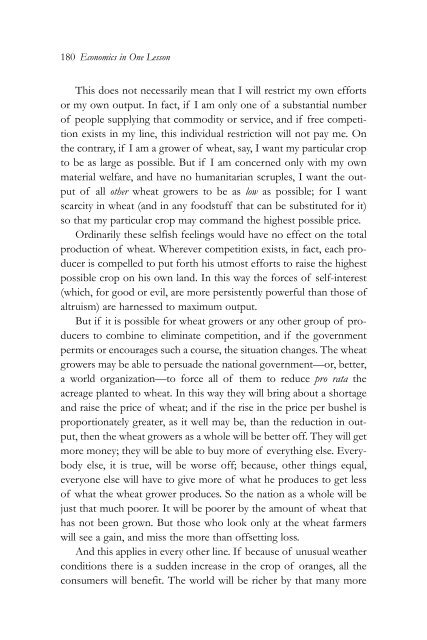1gDdM7w
1gDdM7w
1gDdM7w
- No tags were found...
Create successful ePaper yourself
Turn your PDF publications into a flip-book with our unique Google optimized e-Paper software.
180 Economics in One LessonThis does not necessarily mean that I will restrict my own effortsor my own output. In fact, if I am only one of a substantial numberof people supplying that commodity or service, and if free competitionexists in my line, this individual restriction will not pay me. Onthe contrary, if I am a grower of wheat, say, I want my particular cropto be as large as possible. But if I am concerned only with my ownmaterial welfare, and have no humanitarian scruples, I want the outputof all other wheat growers to be as low as possible; for I wantscarcity in wheat (and in any foodstuff that can be substituted for it)so that my particular crop may command the highest possible price.Ordinarily these selfish feelings would have no effect on the totalproduction of wheat. Wherever competition exists, in fact, each produceris compelled to put forth his utmost efforts to raise the highestpossible crop on his own land. In this way the forces of self-interest(which, for good or evil, are more persistently powerful than those ofaltruism) are harnessed to maximum output.But if it is possible for wheat growers or any other group of producersto combine to eliminate competition, and if the governmentpermits or encourages such a course, the situation changes. The wheatgrowers may be able to persuade the national government—or, better,a world organization—to force all of them to reduce pro rata theacreage planted to wheat. In this way they will bring about a shortageand raise the price of wheat; and if the rise in the price per bushel isproportionately greater, as it well may be, than the reduction in output,then the wheat growers as a whole will be better off. They will getmore money; they will be able to buy more of everything else. Everybodyelse, it is true, will be worse off; because, other things equal,everyone else will have to give more of what he produces to get lessof what the wheat grower produces. So the nation as a whole will bejust that much poorer. It will be poorer by the amount of wheat thathas not been grown. But those who look only at the wheat farmerswill see a gain, and miss the more than offsetting loss.And this applies in every other line. If because of unusual weatherconditions there is a sudden increase in the crop of oranges, all theconsumers will benefit. The world will be richer by that many more


